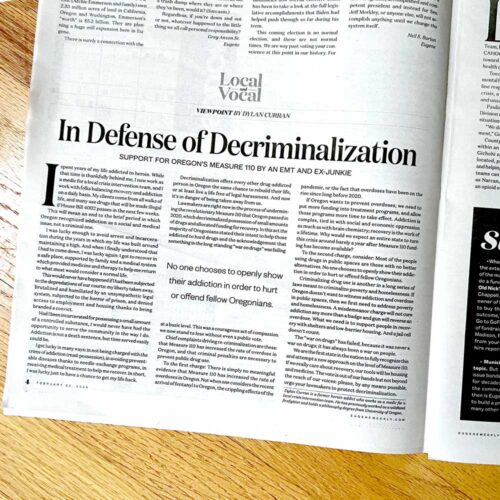
By Dylan Curran
I spent years of my life addicted to heroin. While that time is thankfully behind me, I now work as a medic for a local crisis intervention team, and I work with folks balancing recovery and addiction on a daily basis. My clients come from all walks of life, and many use drugs that will be made illegal if House Bill 4002 passes in the next few weeks.
This will mean an end to the brief period in which Oregon recognized addiction as a social and medical issue, not a criminal one.
I was lucky enough to avoid arrest and incarceration during the years in which my life was built around maintaining a high. And when I finally understood that I had to come down, I was lucky again: I got to recover in a safe place, supported by family and a medical system which provided medicine and therapy to help me return to what most would consider a normal life.
This would never have happened if I had been subjected to the depredations of our courts: my liberty taken away, brutalized and humiliated by an unsympathetic legal system, subjected to the horror of prison, and denied access to employment and housing thanks to being branded a convict.
Had I been incarcerated for possessing a small amount of a controlled substance, I would never have had the opportunity to serve the community in the way I do. Addiction is not a death sentence, but time served easily could be.
I got lucky in many ways: in not being charged with the crime of addiction (read: possession), in avoiding preventable diseases thanks to needle-exchange programs, in receiving medical treatment to help me recover. In short, I was lucky just to have a chance to get my life back.
Decriminalization offers every other drug-addicted person in Oregon the same chance to rebuild their life, or at least live a life free of legal harassment. And now it’s in danger of being taken away from us.
Lawmakers are right now in the process of undermining the revolutionary Measure 110 that Oregon passed in 2020, which decriminalized possession of small amounts of drugs and allocated funding for recovery. In this act the majority of Oregonians stated their intent to help those addicted to hard drugs and the acknowledgement that something in the long-standing “war on drugs” was failing at a basic level. This was a courageous act of compassion we now stand to lose without even a public vote.
Chief complaints driving re-criminalization are these: that Measure 110 has increased the rate of overdose in Oregon, and that criminal penalties are necessary to prevent public drug use.
To the first charge: There is simply no meaningful evidence that Measure 110 has increased the rate of overdoses in Oregon. Not when one considers the recent arrival of fentanyl to Oregon, the crippling effects of the pandemic, or the fact that overdoses have been on the rise since long before 2020.
If Oregon wants to prevent overdoses, we need to put more funding into treatment programs, and allow those programs more time to take effect. Addiction is complex, tied in with social and economic oppression as much as with brain chemistry; recovery is the work of a lifetime. Why would we expect an entire state to turn this crisis around barely a year after Measure 110 funding has become available?
To the second charge, consider: Most of the people using drugs in public spaces are those with no better alternatives. No one chooses to openly show their addiction in order to hurt or offend fellow Oregonians.
Criminalizing drug use is another in a long series of laws meant to criminalize poverty and homelessness. If Oregon doesn’t want to witness addiction and overdose in public spaces, then we first need to address poverty and homelessness. A misdemeanor charge will not cure addiction any more than a badge and gun will reverse an overdose. What we need is to support people in recovery with shelters and low-barrier housing. And a jail cell doesn’t count.
The “war on drugs” has failed, because it was never a war on drugs; it has always been a war on people.
We are the first state in the nation to fully recognize this and attempt a new approach on the level of Measure 110. If we really care about recovery, our tools will be housing and medicine. The vote is out of our hands but not beyond the reach of our voices: please, by any means possible, urge your lawmakers to protect decriminalization.